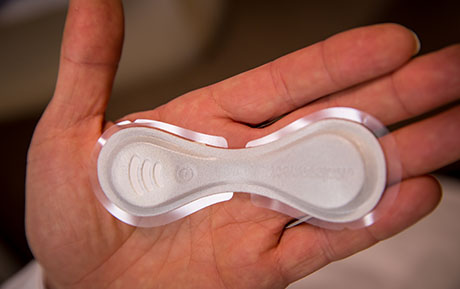Feb 26 2020
A study headed by researchers from the University of Utah Health and VA Salt Lake City Health Care System has proposed a new wearable sensor that operates together with artificial intelligence technology.

Wearable sensors like this one could help doctors remotely detect cardiovascular changes in heart failure patients days before a crisis occurs. Image Credit: Charlie Ehlert.
This sensor could help doctors remotely track critical changes in heart failure patients well ahead of a health crisis and could prevent hospitalization.
According to the researchers, ultimately, the system could help prevent up to one in three heart failure readmissions in the weeks after initial discharge from the hospital, helping patients maintain an improved quality of life.
This study shows that we can accurately predict the likelihood of hospitalization for heart failure deterioration well before doctors and patients know that something is wrong.
Josef Stehlik, MD, MPH, Study Lead Author and Co-Chief of Advanced Heart Failure Program, University of Utah Health
“Being able to readily detect changes in the heart sufficiently early will allow physicians to initiate prompt interventions that could prevent rehospitalization and stave off worsening heart failure,” stated Stehlik, who is also the medical director of the heart failure and heart transplant program at George E. Wahlen VA Medical Center in Salt Lake.
The research has been published in Circulation: Heart Failure, an American Heart Association journal.
Nearly 6.2 million Americans suffer from heart failure, and it is one of the leading hospital discharge diagnoses in the United States. Of these patients, almost 30% will probably be readmitted to the hospital before 90 days of discharge, presenting recurrent symptoms such as shortness of breath, fluid buildup, and fatigue. In several cases, hospitalization reduces the ability of patients to independently care for themselves.
Those individuals who have repeated hospitalizations for heart failure have significantly higher mortality. Even if patients survive, they have poor functional capacity, poor exercise tolerance and low quality of life after hospitalizations. This patch, this new diagnostic tool, could potentially help us prevent hospitalizations and decline in patient status.
Biykem Bozkurt, MD, PhD, Study Co-Author and Director of the Winters Center for Heart Failure Research, Baylor College of Medicine, Houston
This information was transmitted to a smartphone from the sensor through Bluetooth and subsequently sent to an analytics platform created by PhysIQ on a secure server. This platform derived heart rhythm, heart rate, respiratory rate, sleep, body posture, walking, and other normal activities.
With the help of artificial intelligence, the analytics determined a normal baseline for every patient. If the data differed from normal, the platform produced an indication that the heart failure of the patient was worsening.
On the whole, the system precisely estimated the imminent need for hospitalization over 80% of the time. On average, this estimation took place 10.4 days prior to readmission (median 6.5 days).
There’s a high risk for readmission in the 90 days after initial discharge. If we can decrease this readmission rate through monitoring and early intervention, that’s a big advance. We’re hoping even in patients who might be readmitted that their stays are shorter, and the overall quality of their lives will be better with the help of this technology.
Josef Stehlik, MD, MPH, Study Lead Author and Co-Chief of Advanced Heart Failure Program, University of Utah Health
As a next step of the study, the scientists intend to carry out a huge clinical trial that will not just use the system to alert the doctors of changes in the condition of a patient but also monitor whether an early intervention based on these alerts result in fewer rehospitalizations for heart failure.
Apart from Drs Stehlik and Bozhurt, University of Utah Health researchers Jose Nativi-Nicolau, Peter Wohlfahrt, and Heather Hanson contributed to this research. Collaborators from other institutions include C. Schmalfuss, S. Wegerich, K Rose, R. Ray, R. Schofield, A. Deswal, S. Anand, H. Hanson, D. Richards, M. Pipke, J. Sekaric, and M. Phram.
The study was funded by the Department of Veterans Affairs Office of Information & Technology and VHA Innovation Ecosystem. PhysIQ, Inc. built the analytics platform. Pipke, Wegerich, Rose, Anand, Sekaric, and Richards are employed by PhysIQ. Stehlik is a consultant to Medtronic and Abbo.